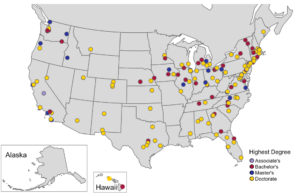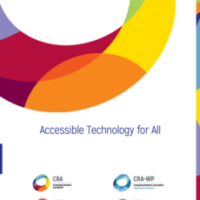More than 170 Institutions Participated in Data Buddies Survey 2022
By Evelyn Yarzebinski, Manager, CERP
The Data Buddies Project is a long-standing project of Center for Evaluating the Research Pipeline (CERP). This project focuses on the experiences of those in the computing community, such as understanding student retention and attrition, as well as factors that may support successful graduate school or other professional experiences. CERP collects this data via the annual distribution of the Data Buddies Survey (DBS). During DBS 2022, which ran from November 2022 to February 2023, 182 units at 171 institutions were active1 and could distribute survey links to their students. CERP additionally directly distributed DBS to cohorts of prior respondents in order to gather longitudinal information. These institutions, ranging from Associate’s-granting to Doctoral-granting, represent 43 states in the US and 2 provinces in Canada. The above visualization shows the geographic range of these institutions.
Following the closure of the survey in February 2023, CERP has been cleaning and analyzing the data, as well as preparing reports for each participating department. CERP additionally produced a descriptive report for DBS 2022, which shows aggregated results across all respondents. The annual report is available for public viewing at this link: https://datavisualization.cra.org/DBS_annualReport_2022.html.
If your academic unit is not currently participating in DBS, consider signing up today! There is no cost to participate. Visit this link for more information: https://cra.org/cerp/volunteer/.

Active Departments for the 2022 Data Buddies Survey
This analysis is brought to you by the CRA’s Center for Evaluating the Research Pipeline (CERP). CERP provides social science research and comparative evaluation for the computing community. Subscribe to the CERP newsletter here. Check out CERP’s activities and find out how to engage on CERP’s website.
This material is based upon work supported by the National Science Foundation under Grant Number (DUE 1821136). Any opinions, findings, and conclusions or recommendations expressed in this material are those of the author(s) and do not necessarily reflect the views of the National Science Foundation.
Notes:
[1] The status of “active” indicates that the academic unit receives communication from CERP regarding survey link distribution. Not all academic units choose to distribute the survey link every year; for example, some units choose to distribute every other year.









